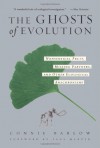Currently reading
Cristofori's Dream
Your Inner Fish: A Journey Into The 3.5 Billion Year History Of The Human Body
The Enchanted Wood
The Sparrow
The Ghosts Of Evolution Nonsensical Fruit, Missing Partners, And Other Ecological Anachronisms
Harvest
 Jim Crace always writes books that are a pleasure to read. They have a certain quiet lyrical quality to them that instantly make them feel like a classic. This particular book is very pastoral as the title suggests. But it's also a quiet horror story at its core. There are parts of this book that you turn over and over in your head, trying to make moral sense of them. And, in the end, you're not really sure if anything could have changed had different choices been made.
Jim Crace always writes books that are a pleasure to read. They have a certain quiet lyrical quality to them that instantly make them feel like a classic. This particular book is very pastoral as the title suggests. But it's also a quiet horror story at its core. There are parts of this book that you turn over and over in your head, trying to make moral sense of them. And, in the end, you're not really sure if anything could have changed had different choices been made. The story starts off in a happy village of serfs who serve a small manor house. The village is turned upside down in the course of a week when various newcomers arrive. The first stranger who comes to town seems to be making a map for the new lord of the manor to turn barley fields into sheep pastures. The second set of strangers who come to town get falsely blamed for the mischief of some local boys & thrown in stocks for 7 days. And a third set of strangers who come to town (the new lord of the manor and his minions) disrupt life and set up a witch hunt. All along the way it becomes more and more apparent that nothing good can come of any of this, and the reader is left anticipating what horror might be on the next page, especially when Mrs. Bedlam, the wife/daughter of the men in stocks, seems to flit unseen about the village like ghost bent on revenge.
At the heart of the story is the narrator who seems to be the only person who is a friend to all from the stocks to the serf village to manor house. And, as such, he should have the power to act as a peace-offering liaison between all the affected parties. However, time and again, he chooses the path of inaction rather than action. And time and again, the reader cringes to watch the results of his decisions to simply do nothing. He could have done X which would have prevented Y, but even so, it seems that Z was still the eventually inevitable consequence. Or was it? Could he have really prevented the various atrocities that befell the people around him? And how can he act so lackadaisical about the consequences of his inactions? And just when will he get his just deserts? Or is he as innocent as he seems to believe himself to be?
I couldn't help but imagine the vengeful "ghost", Mrs. Bedlam, as Helena Bonham Carter. And the ending of the book fittingly ended with me hearing the same spectacular ending song that plays in a particularly favorite nothing-good-can-come-of-all-of-this Bonham Carter movie: Where is My Mind by the Pixies. You've met me at a very strange time in my life indeed.







